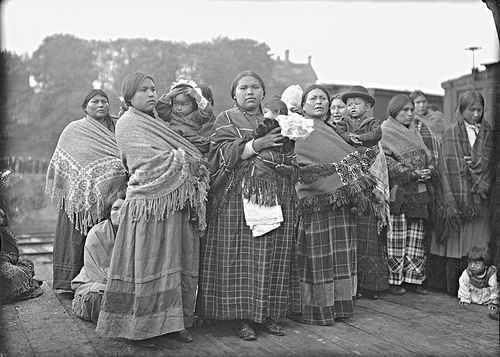COMMENT: The costs of being aboriginal in BC
Being First Nations in BC comes at too high a price. We all know the statistics: dismal success at (white) school; endemic poverty on and off reserve; half the prison population despite being only three percent of the Canadian population; high incidence of sexual abuse; the too high a percentage of children in care; high unemployment; youth suicide; sub-standard housing; premature death and the list goes on ….
We also know the causes: more than 150 years of colonialism; imported diseases; trading land for trinkets; the Indian Act; the federal government; the provincial government; residential schools; racism; attempts at assimilation; apologies without action and that list goes on. Despite rhetoric to the contrary, there is no will for reconciliation and relations continue to be based in the trappings of the past.
The stark realities of the unfair economic costs borne by First Nations are everywhere these days. Governments in Canada seem to have unending and insidious ways of keeping First Nations people indentured to the status quo. Here are a few examples.
First was the call this week from the head of the BC treaty commission for it to produce or be shut down. The treaty process was started twenty years ago with the promise of quick resolution to long-standing demands for fairness. Treaties would settle land claims and provide compensation. First Nations were assured that treaties would be forthcoming quickly and encouraged to borrow money to finance their negotiations. They have spent $500 million on the process so far – most used to pay lawyers’ fees – with $400 million being loans. Even if treaties get concluded – something that seems increasingly unlikely – that money would be skimmed off the top, leaving First Nations with much reduced settlements.
I believe there is a justifiable case to be made for loans to be forgiven. First Nations were misled and should not have to pay so high a price to participate in a broken promise.
The treaty process resembles the structural adjustment programs forced by the International Monetary Fund (IMF) on poor nations to get loans. The loans put the countries on the treadmill of never ending debt repayment and the structural adjustment forces them to transfer publicly owned utilities, land and services to the private sector – almost universally foreign multinational corporations. And the country falls further into the endemic poverty their leaders were trying to escape.
Second, the inequities in the representation of First Nations’ interests at the inquiry into the missing women make a mockery of a desire to get at the truth. The BC Liberal government called the inquiry under duress and severely limited it scope. I don’t like public inquiries because they rarely have a positive result – and they always cost a lot of money.
Like all inquiries, this one is populated by lawyers protecting the interests of their clients. Twenty lawyers are being paid by the public to represent the police and other authorities, one to represent the families of all of the missing women and none for First Nations groups.
This inquiry will look at police behaviour and determine if there are changes that could be implemented that would prevent another serial killer from preying on vulnerable women.
What the inquiry won’t discuss is the obvious. These women were killed because they were poor, addicted and aboriginal. What won’t be condemned are drug policies that force women into prostitution to feed their habits. If we end the so called “war on drugs” and provide treatment and support services, women won’t have to die at the hands of the next Robert Pickton. But that conclusion and recommendations on prevention won’t come from this inquiry. The inquiry won’t call for a guaranteed livable income as a way to prevent the kind of oppressive poverty that keeps aboriginal women trapped in a cycle of hopelessness. The inquiry won’t challenge the macho culture that judges individuals rather than society and asks police to use force or indifference as an instrument of society’s barely concealed racism.
Third, an Enbridge spokesperson said the company is offering First Nations an equity position in the Northern Gateway Pipeline. This is an obvious and unsubtle way to try to buy support for the pipeline that most affected First Nations oppose. It is part of the duty to consult and get consent and it may be successful. If the energy board approves the project and the federal and provincial governments push for it to be built as seems likely, First Nations may need to settle for what they can get. The equity, however, would be paid for over time from the expected profits produced by the project. This amounts to saying that access to First Nations’ land doesn’t warrant equity in and of itself. If First Nations come on-board, they will pay for that equity – in more ways than the financial one – as yet more environmental and social damage in inflicted on their land and communities.
I could discuss other examples – the Canadian military spying on First Nations activities; the welcome but slow implementation of a couple of the recommendations from the Frank Paul inquiry; the court decision to support the Halalt Nation’s right to protect its water. Each in their way illustrates the multiple ways we have of imposing ongoing financial burdens on BC First Nations.
Jane Sterk is the leader of the BC Green Party.


























